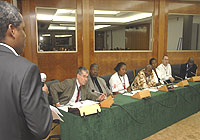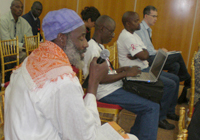
Feature Story
ICASA 2008: Improving national private sector HIV responses
04 December 2008
04 December 2008 04 December 2008
UNAIDS and ILO Joint Satellite Session, 3 December 2008
Credit: UNAIDS
A consensus is emerging at ICASA that in countries across Africa the private sector needs to work more closely together in order to be successful in responding to AIDS.
According to Sophia Kisting, Director of ILO-AIDS speaking at a UNAIDS ILO session yesterday, "The different private sector actors—companies, small and medium enterprises, informal sector—have to work together towards delivering a coherent and comprehensive private sector response to AIDS. We owe that much to those who are affected by the epidemic."
The joint Satellite Session entitled “working towards a comprehensive private sector response at the national level.” It was an opportunity for participants shared what’s working and what needs to be improved in their countries.
Strengthening partnerships across the private sector, reaching out to the surrounding community as well as mobilizing financial and technical resources for HIV were the issues addressed by the delegates.
For this discussion members of the Ghana Business Coalition on AIDS, Federation of Kenyan Employers, Malawi Congress of Trade Unions, Rio Tinto, Standard Bank Africa joined representatives from the International Organization of Employers, ILO, Fondation Sogebank, World Bank, UNAIDS Technical Support Facilities, Partners Against AIDS, GTZ, and the Global Business Coalition on HIV/AIDS, TB and Malaria.
Strengthening partnerships, reaching out to the community

Aldiouma Cissokho addresses the event
Credit: UNAIDS
In Zimbabwe where the Employers’ Confederation, the National Business Coalition and others have created a national forum on the private sector to ensure one voice of the private sector at the Global Fund Coordinating Country Mechanisms.
Another challenge expressed was that have strong leadership. Mr Patrick Obath, Chairman of the Federation of Kenyan Employers, shared their efforts to encourage CEOs to get tested for HIV as a way of generating more support for voluntary testing and counselling within their own companies.
Rio Tinto’s Health Director Mr. Bruno Buclez presented the partnership agreement they have signed with the Government of Cameroon whereby the government is supplying free drugs and the company is making its health facilities available to its employees and to the community. One of the concerns raised about such Public Private Partnerships is their sustainability. This is something Rio Tinto is assessing at the moment. For example, the company is trying to ensure that employees living with HIV who retire from the company continue to receive HIV treatment.
Mr. Tony VanderNest, Senior Health and Wellness, Standard Bank Africa, South Africa explained that his company supports national business coalitions and the Pan African Business Coalition (through notably personnel secondment) because these coalitions are the best vehicle to share experiences among companies.
Mobilizing financial and technical resources for HIV and AIDS.
Ms. Thérèse Lethu, Director from the GBC Europe showcased how the coalition is encouraging sectoral initiatives such as in the tourism and mining industries to optimize the impact of the private sector on the national systems is the primary goal of the GBC.
All participants also agreed that the role of small and medium enterprises should be enhanced. As Erick Maville, Technical Director, GBC Europe explained, "While progress has been made to enhance the contributions of the private sector to the response to AIDS, there is still a lot to do to enhance the participation of small and medium enterprises and the informal sector."
ICASA 2008: Improving national private sector HIV
Cosponsors:
External links:
Oficial web site of ICASA 2008
Contact:
Marie Engel Partnerships Adviser Private Sector Partnerships UNAIDS Tel: +41 22 791 554 Email : engelm@unaids.org



